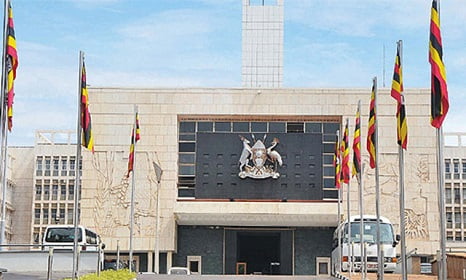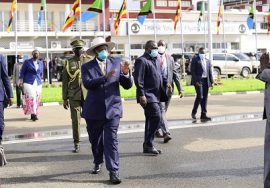
Parliament moves to have NRM MPs decide who becomes Leader of the Opposition
Parliament has granted the Democratic Party’s Richard Lumu (Mityana South) leave to present a private member’s bill, where he is seeking to have all opposition MPs participate in the election of their Leader of Opposition and Chief Opposition Whip, as opposed to having such individuals imposed on them by the main opposition party in Parliament.
Lumu wondered why the Catholics can vote the Pope and Ugandans can vote a President, while a Speaker in Parliament has to be voted by MPs, while excluding the Leader of Opposition from being elected by the people he is meant to lead.
“Election is the epitome of democracy; I am a Catholic; there is an election of the Pope, the highest and most respected leader in the world; if there is an election there, there must be an election here. We are in the opposition; we were elected, and we also elected you (the speaker), which is the very reason why you are seated in that seat. We also elect the President; therefore, there is no reason why, when we come to Parliament as the opposition, we don’t elect our leader, who is the leader of the opposition,” argued Lumu.
He added, “It is important that the pillar of democracy, which is election, should actually be done by us, the opposition, who are actually bout to take power. We need an election, clear, in the opposition. Section 8 of the Administration of the Parliament Act Cap 272 provides for the election of the Leader of Opposition by the Party in Opposition having the greatest numerical strength in Parliament. The Rules also say that other parties should be consulted; my party has never been consulted on that whenever there is a new or other leader of opposition.”
However, Okin Ojara (Chwa West) disagreed with Lumu’s argument, saying the status quo hasn’t posed any challenges and noting, “The current arrangement in Parliament is working appropriately because, when you look at the entire structure of Parliament, we haven’t had a situation in Uganda where the ruling government elects their Party Chief Whips, where we have the Prime Ministers being elected, so this motion that he is trying to present is actually very dangerous.”
Denis Oneka (Kitgum Municipality) wondered why the Northern Regional Sitting should be used as a platform to settle personal vendetta amongst opposition MPs, noting, “This is a special regional sitting and the first of its kind, and the regional sitting has begun from the Northern Region, and as such, I would really request that it remain a special sitting for the Northern Region. I see vividly, personal fights being embedded in a peaceful sitting. I would like us to proceed in the same spirit of the special sitting. This motion can be raised when we are back at Parliament, not at the regional level. Is it really procedurally right to proceed in this manner for us to bring personal vendetta in regional sitting?”
However, Speaker Among ruled in favor of Lumu, asking the disgruntled MPs to reject Lumu’s bill on second reading if they so wish, remarking, “Much as we are sitting in Gulu, this is a normal sitting. And as I said, let us not act in anticipation; there is no fight. The law isn’t made for one person; today I may be the leader of opposition, and tomorrow another person will be the leader, but I don’t see any fight in this thing, and you can reject it when it comes to the second reading. We shouldn’t deny a member his right, which is enshrined in the constitution.”
National Unity Platform’s Michael Kakembo (Entebbe Municipality), while seconding Lumu’s motion, argued that there is nothing wrong with opposition MPs voting their own leader, saying such a move will ensure the current culture of the Leader of Opposition thinking that they own all opposition MPs.
“I am convinced that this move is going to give us more unity as the opposition and respect for each other. Let us vote for our leaders; what is wrong with that? I am standing here to second this motion in good faith; it will help us; it will build us more because unity of the opposition means strength of the opposition and respect for each other. I must participate in the electing of my leader as the opposition,” said Kakembo.
He added, “We have seen many times in Parliament where the Leader of Opposition thinks that all opposition belongs to his party; in this case it used to be FDC, and all the opposition would see as FDC, yet not. Because we didn’t participate in the election of the Leader of Opposition, now we are seeing the National Unity Platform (NUP). Come vote for your leader; he will respect you; he will unite all of us, and with that, it will make us stronger.”
Implication
The implication is that once the Bill goes through, the NRM MPs, who are the majority in the House, will decide who becomes the Leader of the Opposition in Parliament.







